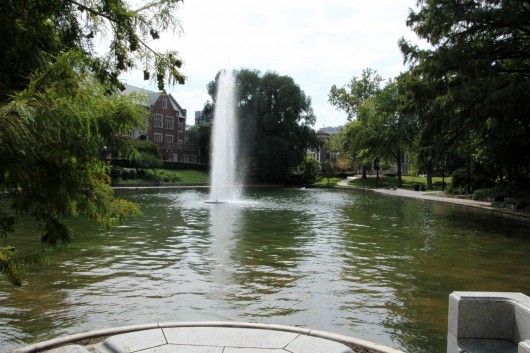Water loaded with fecal matter and injuries and assaults fueled by alcohol.
These were just a few of the concerns experts discussed on Wednesday during the third and final Undergraduate Student Government-hosted Mirror Lake jump forum.
Speakers with expertise ranging from water quality to sexual assault sat down with members of the Ohio State community to talk about the future of the Mirror Lake jump following backlash surrounding last year’s jump and uncertainty about this year’s.
Tyler Gorham, a graduate fellow at the College of Public Health, talked in-depth about the water quality of Mirror Lake on the night of the jump.
Gorham said the levels fecal matter in the lake on the night of the jump can be expected to make at least eight out of every 1,000 students sick in some capacity.
The rise in the ammonia levels is directly attributed to students urinating in the lake, Gorham said.
“Students should be encouraged to go to the jump earlier than previous years to avoid the lake when the levels of toxins are the highest,” Gorham said. “Some other ways to not get sick would be to not submerge your head, get out of the water as soon as possible, and possibly if some rinsing stations were set up, that would help immensely.”
On top of the amount of students getting sick because of the water quality, between 20-30 students are seen at the Wexner Medical Center the night of the jump, which is about four times higher than the typical night, according to Michael Mandelkorn, security director for Wexner Medical Center.
“We see students with lacerations, broken bones, and on years where the weather is cold, hypothermia is one of the main concerns,” Mandelkorn said.
Of those 20-30 students seen at Wexner Medical Center the night of the jump, nearly all of them intoxicated to some degree, Mandelkorn said.
That statistic led all of the panelists to agree on what they think would be the best way to make the jump safer for students.
“I think lessening the amount of alcohol consumed before the jump would be the best way to eliminate most of our safety concerns,” Ohio State Police Captain Eric Whiteside said during the forum. “Of the 5-10 arrests made each year on average, the vast majority of them are alcohol-related.”
Like many other events with a large number of people and large amounts of alcohol consumption, sexual assaults are also a concern on the night of the Mirror Lake jump, but student volunteers could help, according to Michelle Bangen, sexual violence prevention coordinator at the Student Wellness Center.
“For the night of the event, just having additional eyes on the scene and being able to pick up on red flags is always valuable,” Bangen said. “Having someone who is sober to do that makes the decision-making process that much easier.”
Bangen said prevention and bystander training are the best ways to reduce sexual assaults the night of the jump, and that sexual assaults are much more likely to be perpetrated by someone the victim knows and not the “creepy guy in the alley.”
About two-thirds of rapes are committed by someone known to the victim, according to the Rape, Abuse and Incest National Network website.
This year, the jump could be threatened by various unconfirmed plans to change the water source to the lake and relandscape the surrounding area.
The lake was drained after last year’s jump to allow for work on a roughly $28,000 sustainability study aiming to prevent water loss because of leaks in the lake’s structure. The study was also set to address maintenance issues related to deterioration of the lake’s walls. The study, which concluded in July, ultimately determined that groundwater is a viable option for sustaining the lake, officials have said.
Mirror Lake was refilled in early August with water from a recently-dug well that cost an additional $30,000, but a final design for Mirror Lake is set to be selected in early November. In the meantime, officials have said the lake could be drained again.
Last year, OSU required students to get a wristband for entry to the jump and fenced off the area. In protest, some students jumped the night before the scheduled jump.
After the three USG discussions held regarding the Mirror Lake jump, some students said they’re optimistic that the jump will continue.
“I don’t foresee the jump being canceled, but I do think there is going to be significant changes,” Samuel Reed, a second-year in environmental science, said. “I think last year was a little bit of a taste with the fences. What I am hoping for is more safety regulation rather than more of a police force, but ultimately it comes down to the administration and what they want to do.”
USG President Celia Wright, a fourth-year in public health, said USG senators are set to continue working on things related to the Mirror Lake jump after the forums.
“We will follow these forums with a discussion period among senators and a time for them to work on legislation with a hope that we can produce some product that will outline why and how we want this tradition to be preserved long term,” Wright said. “Speaking personally, I can say that I definitely want the jump to continue.”
Clarification: September 28, 2014
An earlier version of this story incorrectly said levels of ammonia in Mirror Lake the night of the Mirror Lake jump are of concern to people’s health. While there are health concerns about levels of fecal matter in the water, health officials are unsure of any public health implications of urine in the water.



